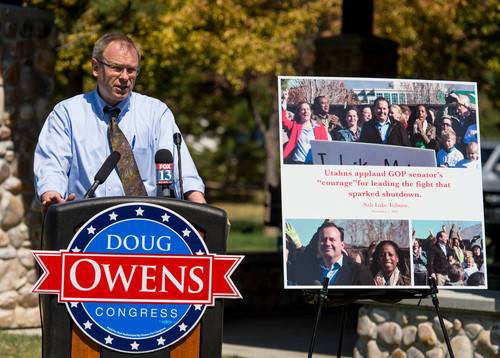This is an archived article that was published on sltrib.com in 2014, and information in the article may be outdated. It is provided only for personal research purposes and may not be reprinted.
TV viewers saw the first Utah campaign ads of the midterm elections Monday morning — 30 second spots touting Mia Love's run in the 4th Congressional District.
What is starting as a trickle is expected to turn into a strong and steady stream in coming weeks.
But at this point, it seems unlikely Utah will see a repeat of the deluge of campaign ads it endured during the 2012 contest, because no national political groups or congressional campaign committees have gotten involved in any of the races.
Doug Owens, Love's Democratic opponent, delayed the start of his ads for a week, a move that saved the campaign about $30,000. The campaign is prepared to pay for its first week of ads, which will begin on Sept. 22.
"Going up on the 22nd was the best decision for us," said Casey Frary, Owens' campaign manager. "Once we go up, we want to be up and very present through Election Day. This makes sure that happens."
That's fine with the Love camp.
"I like us having a week free without having anyone bash at us," said Dave Hansen, Love's campaign manager.
Love's TV ad campaign is spread mostly among Utah's four major broadcast stations, where her ads are expected to run 707 times from now through Election Day costing $346,840. In contrast, Owens plans to have his ads run 522 times on the broadcast stations at a cost of $212,061. Both candidates are also planning to advertise on cable.
If this pattern holds, the ads will be a pittance compared to the $10 million fight between Love and Rep. Jim Matheson, D-Utah, in 2012. Matheson, who has decided against seeking another House term, beat Love by fewer than 800 votes in a campaign fueled by thousands of TV spots, many of them attack ads.
Love's first two ads in 2014 are "quite light," said Hansen, positive pieces that focus on her views on education and health care. The Love campaign also launched its first radio ads and both candidates have billboards, with some of Love's tag lines being: "Funding classrooms, not Washington," and "Attacking problems, not people," and Owens' billboards saying "Utah roots. Utah values." and "Working to put Utah first."
Recent polls show Love, the former mayor of Saratoga Springs, has a significant lead over Owens, a corporate defense attorney, in the contest to represent western Salt Lake and Utah counties and parts of central Utah. Love also is far more widely known than Owens, who has never run for office before, but is the son of the late Rep. Wayne Owens, D-Utah. Doug Owens believes he can cut into that lead by highlighting positions Love took in her 2012 campaign, including calling for the elimination of the Department of Education and federally backed student loans.
"I think we are looking forward to being able to get Doug's message out to a wider audience," Frary said. "Doug has a lot of respect for anyone who runs for office, but [Love] has taken a lot of extreme positions and it is important to highlight those differences."
No other congressional candidates have booked any TV spots. The only other Utah candidates to reserve time with the broadcast channels are Salt Lake County District Attorney Sim Gill and County Sheriff Jim Winder, both Democrats seeking reelection.
Gill and Winder, like Owens, have contracted with Love Communications (no relation to the Republican congressional candidate) to handle their TV advertising.





